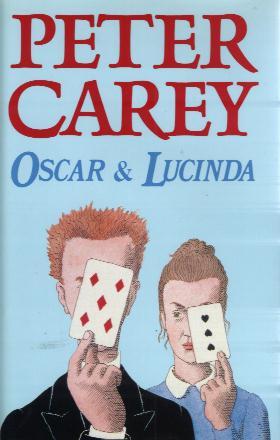
Peter Carey
The following novels constitute the shortlist for the 1988 Booker Prize:
Notable Omissions from the 1988 Shortlist

|
Oscar and Lucinda Peter Carey |
Dustjacket Synopsis:
"Peter Carey's eargerly awaited new novel imagines Australia's youth, before its dynamic passions became dangerous habits. It is also a startling and unusual love story.
"Oscar is a young English clergyman who has broken with his past and developed a disturbing talent for gambling. A country girl of singular ambition, Lucinda moves to Sydney, driven by dreams of self-reliance and the building of an industrial Utopia. Together this unlikely pair create and are created by the spectacle of mid-nineteenth century Australia.
"Peter Carey's visionary brilliance, and his capacity to delight and surprise, propel this story to its stunning conclusion."
Quotes:
"Luminous and magical, Oscar and Lucinda dances with a shimmer of light and dark as
its two noble gamblers play out dreams of God and glass. A spectacular achievement." - Helen Daniel
"Oscar and Lucinda are two of the most perfectly realised characters in modern fiction. An
immensely skilful and absorbing juxtaposition of a gently comic, obliquely ironic, and
deeply compassionate vision of human existence." - David Williamson
"The most audacious and rewarding of all Carey's novels." - Geoffrey Dutton
"Peter Carey is a complete writer. He has all the skills, and knows all the tricks. He can combine a genius for stark,
under-stated comedy, with a nearly Dickensian generosity of description; the result is that hardly a character passes
through this novel without Carey enlightening us to the peculiarities of physiognomy, psychology and personal history
that establish that character's unique and lasting patent over a portion of the reader's memory." - Aravind Adiga,
Second Circle
First Paragraph:
If there was a bishop, my mother would have him to tea. She would sit him, not where you would imagine, not at the head of the big oval table, but in the middle of the long side, where, with his back to the view of the Bellinger River, he might gaze at the wall which held the sacred glass dageurreotype of my great-grandfather, the Reverend Oscar Hopkins (1841-66).
These bishops were, for the most part, bishops of Grafton. Once there was a bishop of Wollongong, travelling through. There was also a canon, and various other visiting or relieving reverends. Sometimes they were short-sighted or inattentive and had to have the dageurreotype handed to them across the table. My mother crooked her finger as she picked up her tea-cup. She would not tell the bishops that my great-grandfather's dog-collar was an act of rebellion. They would look at a Victorian clergyman. They would see the ramrod back, the tight lips, the pinched nose, the long stretched neck and never once, you can bet, guess, that this was caused by Oscar Hopkins holding his breath, trying to stay still for two minutes when normally - what a fidgeter - he could not manage a tenth of a second without scratching his ankle or crossing his leg.
From the UQP hardback edition, 1988.
You can read further details of this and other novels by Peter Carey on this webpage.
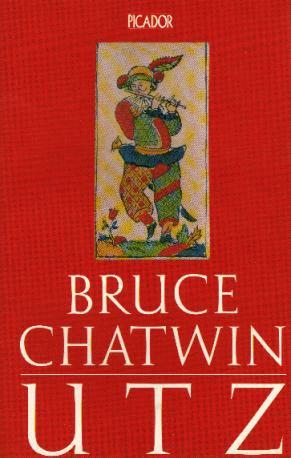
|
Utz Bruce Chatwin |
Quotes:
"For my money, Bruce Chatwin is the greatest stylist writing in England today...Not a word
is wasted in the telling of this tale. Each sentence is fashioned, polished, and put into
place with microscopic care" - Nicholas Shakespeare, Daily Telgraph
"This shiny little novel is not just about pretty porcelain figurines, but about dirty great
issues of life and death" - Philip Howard, The Times
"Bruce Chatwin knows his objets d'art, and the writing has the warmth of a double
fascination - of the collector's fascination with portable art, and with the author's
fascination with collectors as a species" - John Harvey, The Sunday Telegraph
"With Chatwin, the real excitement derives from an intellectual drama, in dialogues about
art as a surrogate creation, a robbery of divine power, and art collecting as idolatory...For
Chatwin, ideas are the supreme fictions" - Peter Conrad, Observer
"A highly sophisticated, highly civilized jeu d'esprit" - New York Times Book Review
First Paragraph:
An hour before dawn on March 7th 1974, Kaspar Joachim Utz died of a second and long-expected stroke, in his apartment at No. 5 Siroka Street, overlooking the Old Jewish Cemetery in Prague.
Three days later, at 7.45 a.m., his friend Dr Vaclav Orlik was standing outside the Church of St Sigismund, awaiting the arrival of the hearse and clutching seven of the ten pink carnations he had hoped to afford at the florist's. He noted with approval the first signs of spring. In a garden across the street, jackdaws with twigs in their beaks were wheeling above the lindens, and now and then a minor avalanche would slide from the pantiled roof of a tenement.
From the Picador paperback edition, 1988.
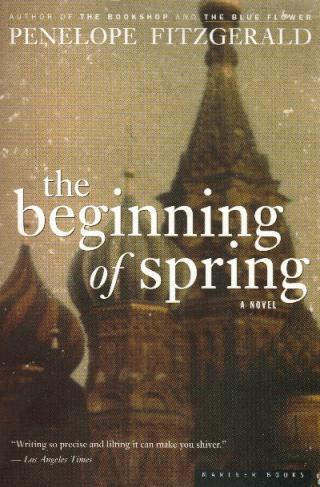
|
The Beginning of Spring Penelope Fitzgerald |
Dustjacket synopsis:
"It is March 1913, and dear, slovenly Mother Moscow, her windows still sealed against the cold of
winter, is stirring herself to meet the beginning of spring. Change is in the air - uncertainty,
too - and nowhere more than at 22 Lipka Street, the home of the English printer Frank Reid.
Frank returns home from work one night to find that his wife has gone away; no one knows where or
why, or whether she'll ever come back. All Frank knows for sure is that he is now alone and must
find someone to care for his three young children.
"Into Frank's life comes Lisa Ivanova, a quiet, calming beauty from the country, untroubled to the poit of seeming simple. Bus is she? And why as Frank's bookkeeper, Selwyn Crane, gone to such lengths to bring these two together? Who is the passionate Volodya, who breaks into the press at night - a thief, an agitator, a would-be murderer? Frank sees, but only dimly, for he is a rational man in Moscow, a city where human experience - of love and friendship, of politics and power - is always at its most unfathomable."
Quotes:
"A marvellous book...bristling with wry comedy." - Dan Cryer, Newsday
"Fitzgerald...has mastered a city, a landscape, and a vanished time. She has written something
remarkable, part novel, part evocation, and done so in a prose that never puts a foot wrong...The
Beginning of Spring is her best novel to date." - Anita Brookner, The Spectator
First Paragraph:
In 1913 the journey from Moscow to Charing Cross, changing at Warsaw, cost fourteen pounds, six shillings and threepence and took two and a half days. In the March of 1913 Frank Reid's wife started out on this journey from 22 Lipka Street in the Khamovniki district, taking the three childrenwith hr - that is Dolly, Ben and Annushka. Annishka (or Annie) was two and three-quaters and likely to be an even greater nuisance than the others. However Dunyasha, the nurse who looked after the children at 22 Lipka Street, did not go with them.
Dunyasha must have been in the know, but Frank Reid was not. The first he heard about it, when he came back from the Press to his house, was from a letter. This letter, he was told by the servant Toma, had been brought by a messenger.
From the Mariner Books paperback edition, 1998.
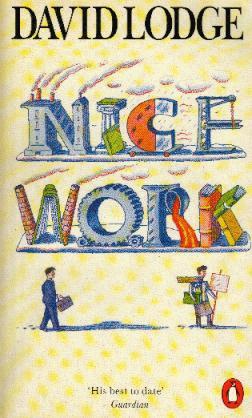
|
Nice Work David Lodge |
Dustjacket synopsis:
Quotes:
"His best to date" - Guardian
"The campus novel meets the industrial novel...Lodge charts an improbable but highly
entertaining relationship between Vic Wilcox (MD of Pringle's engineering firm) and Dr Robyn
Penrose (temporary Lecturer in English, and fully paid-up devotee of semiotic materialism)...The
result is compulsive reading" - David Profumo, Daily Teleraph
"A work of immense intelligence, informative, disturbing and diverting...The book confirms
David Lodge's right to be taken very seriously indeed as one of the best novelists of his
generation" - Anthony Burgess, Observer
"Rich in reserves of humour and irony...the book is a delight" - Mail on Sunday
"A warm comic glow settles on every page" - Financial Times
"A feast of fun" - Kingsley Amis
"As a comedy of society and class misunderstandings, Lodge has never observed more
sharply...A very nice work indeed" - Andrew Sinclair, The Times
First Paragraph:
Monday, January 13th, 1986. Victor Wilcox lies awake, in the dark bedroom, waiting for the quartz alarm clock to bleep. It is set to do this at 6.45. How long he has to wait he doesn't know. He could easily find out by groping for the clock, lifting it to his line of vision, and pressing the button that illuminates the digital display. But he would rather not know. Supposing it is only six o'clock? Or even five? It could be five. Whatever it is he wouldn't be able to get to sleep again. This has become a regular occurrence lately: lying awake in the dark, waiting for the alarm to bleep, worrying.
Worries streak towards him like enemy spaceships in one of Gary's video games. He flinches, dodges, zaps them with instant solutions, but the assault is endless: the Avco account, the Rawlinson account, the price of pig-iron, the value of the pound, the competition from Foundrax, the incompetence of his Marketing Director, the persistent breakdowns of the core blowers, the vandalizing of the toilets in the fettling shop, the pressure from his divisional boss, last month's accounts, the quarterly forecast, the annual review...
From the Virago paperback edition, 1997.
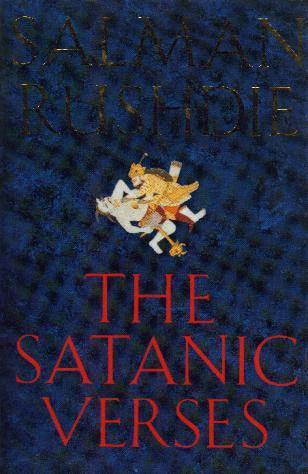
|
The Satanic Verses Salman Rushdie |
Dustkacket Synopsis:
"Just before dawn one winter's morning a hijacked jumbo-jet blows apart high above the English
Channel. Through the debris of limbs, drinks trolleys, memories, blankets and oxygen masks,
two figures fall towards the sea without the benefit of parachutes: Gibreel Farishta, India's
legendary movie star, and Saladin Chamcha, the man of a thousand voices, self-made self and
Anglophile supreme. Clinging to each other, singing rival songs, they plunge downward, and are
finally washed up, alive, on the snow-covered sands of an English beach. A miracle; but an
ambiguous one, because it soon becomes apparent that curious changes are coming over them.
Gibreel seems to have acquired a halo, while, to Saladin's dismay, his legs grow hairier, his
feet turn into hoofs, and there are bumps burgeoning at his temples.
"So begins The Satanic Verses, Salman Rishdie's first novel for five years.
"Gibreel and Saladin have been chosen (by whom?) as protagonists in the etrenal wrestling match between Good and Evil. But which is which? Can demons be angelic? Can angels be devils in disguise? As the two men tumble through their tale, through time as well as space, towards their final confrontation, we are witnesses to a cycle of extraordinary stories, tales of love and passion, of betrayal and faith: the story of Ayesha, the butterfly-shrouded visionary who leads an Indian village on an impossible pilgrimage; of Allie, the mountain-climber haunted by a ghost who urges her to attempt the ultimate feat - a solo ascent of Everest; of murders, metamorphoses and riots in a London 'visible but unseen'; and centrally, the story of Mahound, the recipient of a revelation in which satanic verses mingle with divine.
"In this great wheel of a book, where the past and the future chase each other furiously, Salman Rushdie takes us on an epic journey, a journey of tears and laughter, of wonderful stories and astonishing flights of the imagination, a journey towards the evil and the good that lie inseparably entwined within the hearts of women and men."
First Paragraph:
'To be born again,' sang Gibreel Farishta tumbling from the heavens, 'first you have to die. Ho ji! Ho ji! To land upon the bosomy earth, first one needs to fly. Tat-taa! Taka-thun! How to ever smile again, if first you won't cry? How to win the darling's love, mister, without a sigh? Baba, if you want to get born again...' Just before dawn on winter's morning, New Year's Day or thereabouts, two real, full-grown, living men fell from a great height, twenty-nine thousand and two feet, towards the English Channel, without benefit of parachutes or wings, out of a clear sky.
'I tell you you must die, I tell you, I tell you," and thusly and so beneath a moon of alabaster until a loud cry crossed the night, 'To the devil with your tunes,' the words hanging crystalline in the iced white night, 'in the movies you only mimed to playback singers, so spare me these infernal noises now.'
From the Viking hardback edition, 1988.
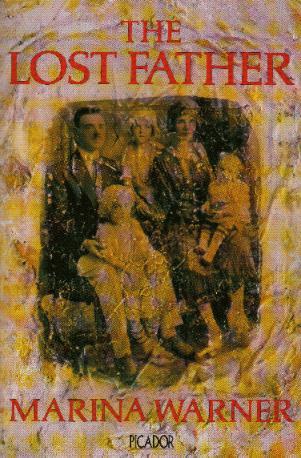
|
The Lost Father Marina Warner |
Quotes:
"An idiosyncratic and haunting novel: lush, slow-paced, sensual, metaphorical and, at the
same time, anxiously worrying over the demands of kinship and the trail of history...this is
a cultural historian's novel and the scholarly curiosity that went into Marina Warner's
fine books on female myths and iconography makes here for a devotedly careful
recreation" - Hermione Lee, Observer
"Marina Warner's fiction has a slow, dreamy quality that is at once pleasurable and slightly
sinister...this is a moving book, and a very bookish one" - Lorna sage, Times Literary Supplement
"Warner's language and pace astonsih and reward. Her characters, male and demale, elderly and children,
strike again and again the unexpected true note, whether playing, grieving, lusting, skinning
fowl for dinner or complaining abut politics" - Marianne Wiggins, The Sunday Times
"The Lost Father has all the pleasures of a literary crossword puzzle, combined with
a brilliantly realised women's world of snail hunting and water carrying, of the terrors of
the passegiata and of old maidhood. It is Warner's best novel so far..." - Lorraine
Fletcher, The Guardian
"A subtle, lyrical novel...shows a compeling imagination at odds with a sceptical and troubled
intelligence" - Patrick Parrinder, London Review of Books
"Marina Warner has written an ambitious novel of rare imaginative power...it has the ring of
absolute authenticity - the heat and dust of a primitive Italian community hedged in by
centuries of custom and sorrow. By the time I finished The Lost Father I had been
made quite Mediterranean, sand-bagged by the sensual" - Ian Thomson, The Independent
"A rich and magisterial novel" - Michiko Kakutani, The New York Times
First Paragraph:
LONDON, 1985
'"Like the needle her mother would burnish in a candle flame before probing under her skin, memories of those days pierced her with a sudden clarity; a sister's footfall on the scoured stairs, the nursey smell of clothes boiling in the copper cauldron on the stove, the angle of another sister's head, intent on the pattern she was cutting on the table. For long stretches she preferred to live in deliberate forgetfulness.
"But sometimes, she couldn't stop the memories coming. In the same way as she'd sometimes want an ice cream even though she knew her teeth would feel skinned alive, she'd lift the blinds and look into the sunlight of those days, and then, above all, she'd see her father, and he was shaving."
I paused. Your head remained cocked so that you could see through your bifocals the button you were sewing.
'What do you think so far?' I asked. I tapped the pages of the manuscipt together on my lap.
From the Picador hardback edition, 1989.
Notes:
This novel was the winner of the 1988 Macmillan Silver Pen Award.
Notable Omissions from the Shortlist:
"The Lyre of Orpheus", Robertson Davies
"Mother's Daughter", Elaine Feinstein
"The Sugar Mother", Elizabeth Jolley
"A Case of Knives", Candia McWilliam
"Forty-Seventeen", Frank Moorhouse
"Ice-Candy-Man", Bapsi Sidhwa
This page and its contents are copyright © 2002-05 by Perry Middlemiss, Melbourne, Victoria, Australia.
Last modified: October 24, 2005.